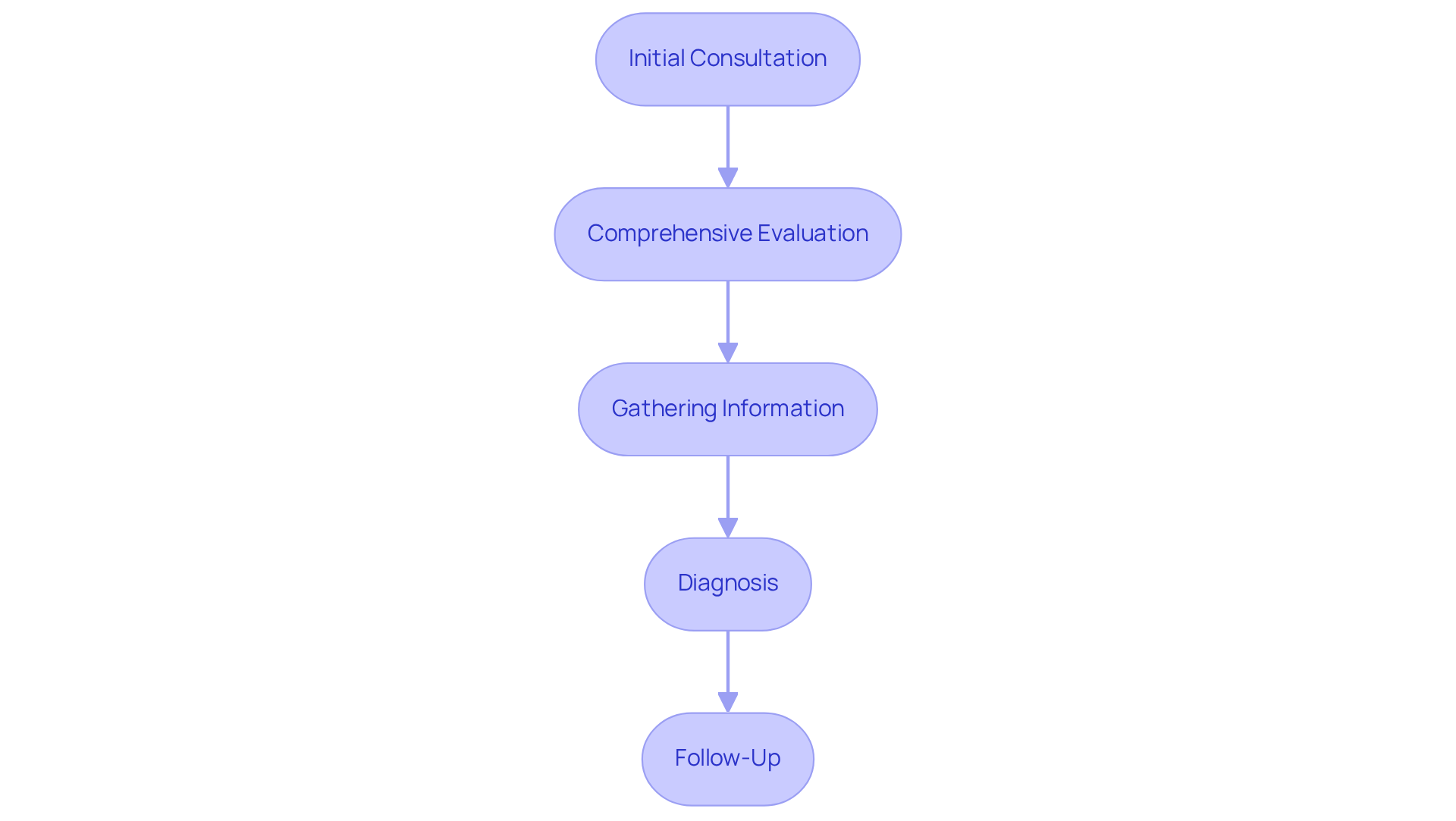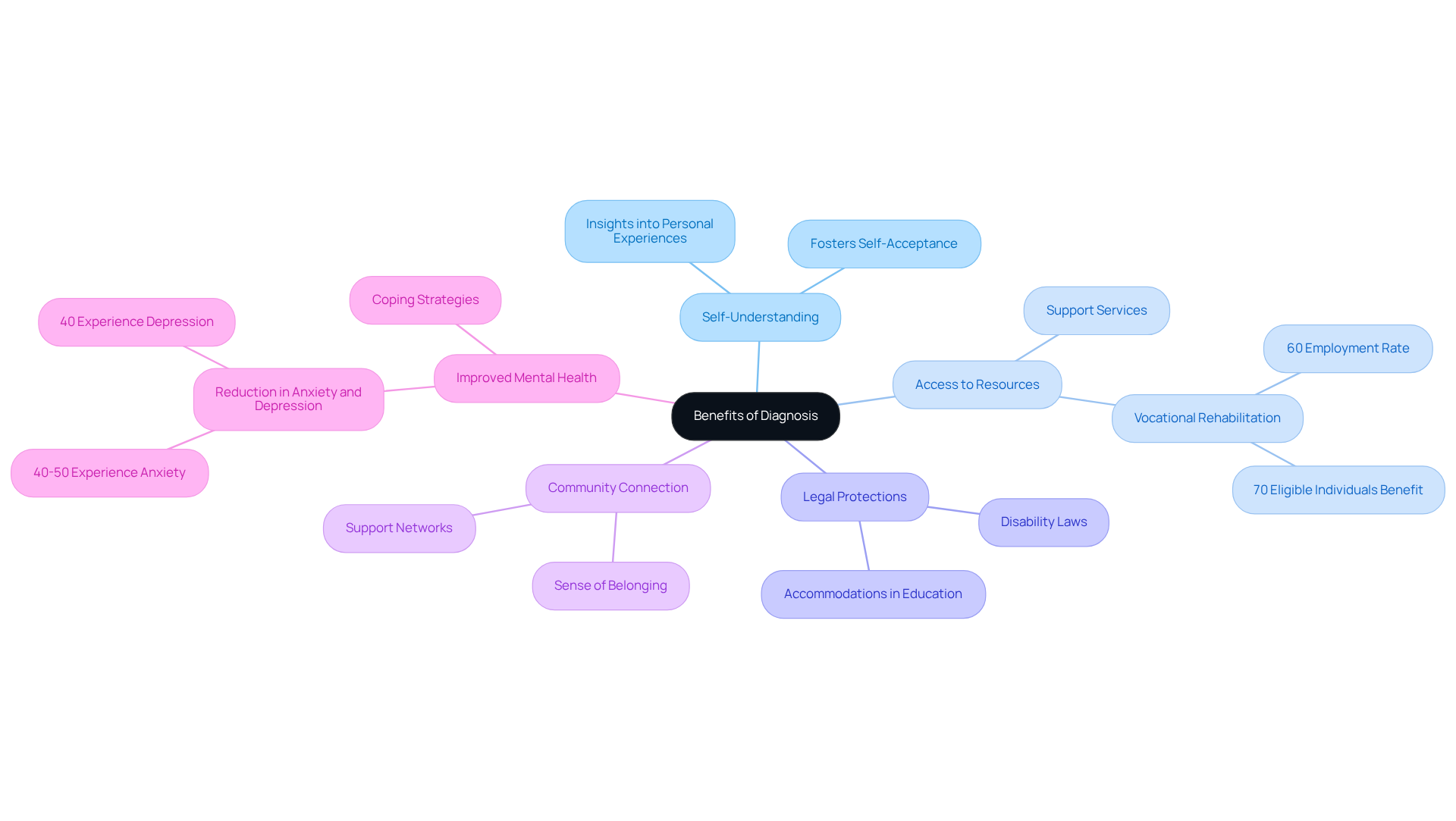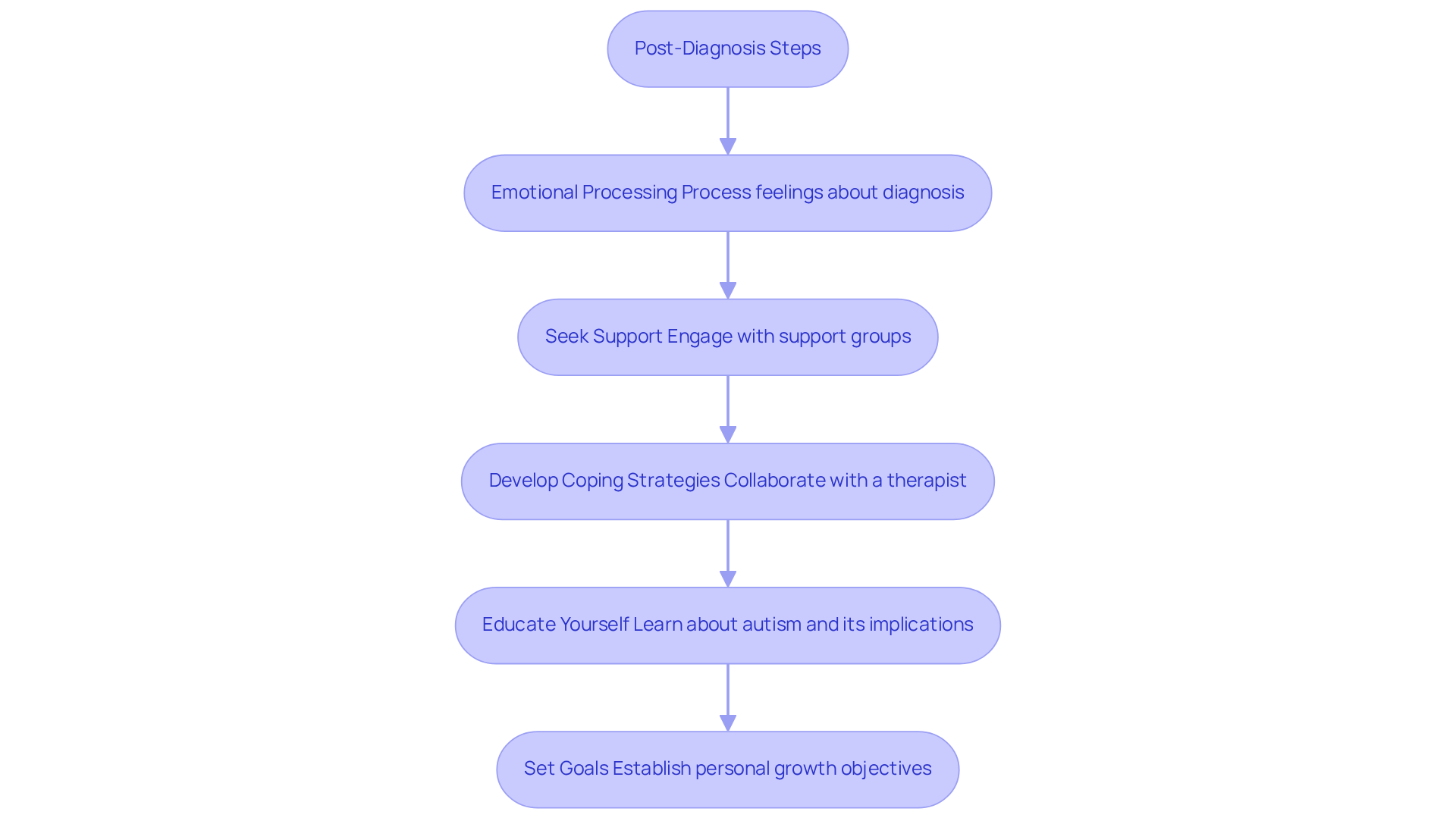Overview
This article provides a compassionate guide for adults seeking an autism diagnosis, highlighting the vital steps of:
- Self-reflection
- Professional consultation
- Resource accessibility
Understanding your symptoms and experiences is crucial, as it paves the way for a comprehensive evaluation by a qualified professional. This evaluation can lead to a formal diagnosis, which not only opens doors to essential support services but also significantly enhances your overall quality of life. By taking these steps, you are not just seeking a label; you are embarking on a journey towards understanding yourself better and accessing the help you deserve.
Introduction
Navigating the complexities of adult life can be a daunting experience, particularly for those who may be on the autism spectrum yet lack a formal diagnosis. Recognizing one's symptoms and experiences serves as a vital first step in this journey, as it lays the foundation for a thorough evaluation and necessary support.
This article explores the essential steps for obtaining an autism diagnosis as an adult, emphasizing the transformative benefits of understanding one's neurodiversity.
But what comes next after the diagnosis? How can individuals effectively manage the emotional and practical challenges that arise in its wake?
Assess Your Symptoms and Experiences
Begin by taking a moment to reflect on your life experiences and any challenges you have faced. This contemplation is a vital first step in understanding your journey.
- Identify Symptoms: Start by compiling a list of behaviors or feelings that might suggest autism. Common indicators include difficulties in social interactions, sensory sensitivities, and repetitive behaviors. It's important to note that research indicates that between 40 and 50% of autistic individuals experience anxiety, highlighting the prevalence of social interaction challenges among adults.
- Document Experiences: Take the time to write down specific instances where you felt out of place or faced difficulties in social situations. This documentation will aid you in articulating your experiences during consultations, making it easier for healthcare providers to grasp your unique challenges.
- Use Self-Assessment Tools: Consider engaging with online self-assessment quizzes tailored for adults, such as the Autism Spectrum Quotient (AQ) test. These tools can offer preliminary insights into your traits and help you assess the likelihood of being on the autism spectrum. Psychologists emphasize that these self-evaluation tools serve as a helpful starting point for discussions with professionals, as they can contextualize your insights within a clinical framework.
- Seek Feedback: Reach out to trusted friends or family members about your behaviors and experiences. Their perspectives can provide additional context and validation, helping you recognize patterns that you may not have noticed on your own.
- Reflect on Childhood: Take a moment to think back to your childhood and any signs that may have been overlooked. Many adults find that their symptoms were evident from a young age, but they were only recognized as a developmental disorder after being diagnosed with autism as an adult. Understanding this history can be crucial in the diagnostic process, particularly in the context of being diagnosed with autism as an adult, as it offers a comprehensive view of your experiences over time.
Cautionary Note: Always consult with a qualified medical provider regarding any questions you may have about a medical condition or treatment, and before starting any new health care regimen.

Understand the Diagnostic Process
The process of being diagnosed with autism as an adult typically involves several key steps that can be both enlightening and reassuring.
-
Initial Consultation: Start by scheduling an appointment with a healthcare provider, such as a psychologist or psychiatrist, who specializes in adult autism. This is your opportunity to share your symptoms and personal experiences in detail, laying the groundwork for understanding.
-
Comprehensive Evaluation: You can expect a thorough evaluation that may include:
- Clinical Interviews: The clinician will conduct in-depth interviews to explore your history, behaviors, and challenges, creating a safe space for discussion.
- Standardized Assessments: Tools like the Autism Diagnostic Observation Schedule (ADOS-2) may be utilized to evaluate your social communication and behavior, providing a structured approach to your assessment.
-
Gathering Information: Your clinician may also seek input from family members or close friends. Their insights can offer a comprehensive understanding of your behaviors across different contexts, shedding light on your daily functioning and experiences.
-
Diagnosis: After the assessment, the clinician will determine if you meet the criteria for spectrum disorder (ASD), which is crucial when considering being diagnosed with autism as an adult, as specified in the DSM-5 guidelines. It's vital to recognize that the estimated prevalence of autism among adults is approximately 2.21%, underscoring the importance of this diagnostic process.
-
Follow-Up: If diagnosed, you will discuss potential next steps, including therapy options, support groups, and resources tailored to your specific needs. Organizations like ASD Media provide various resources to help individuals navigate this journey, ensuring you have access to the support necessary for improving your quality of life. This follow-up is essential for creating a personalized strategy to address your challenges, offering hope and direction as you move forward.

Explore the Benefits of Diagnosis
For individuals being diagnosed with autism as an adult, obtaining an official diagnosis can significantly enhance their quality of life and that of their families.
- Self-Understanding: A diagnosis provides valuable insights into personal experiences and behaviors. It helps individuals understand why certain situations may be challenging, fostering a transformative journey toward greater self-acceptance and personal growth.
- Access to Resources: With a formal diagnosis, individuals often unlock a range of support services, including therapy, social skills training, and community resources tailored for those on the autism spectrum. This access is vital; nearly 60% of people with autism in the U.S. find employment after receiving vocational rehabilitation (VR) services. Furthermore, 70% of eligible autistic individuals in the U.S. benefit from these programs, highlighting their crucial role in improving employment outcomes.
- Legal Protections: A formal diagnosis also offers legal safeguards under disability laws, ensuring individuals receive necessary accommodations in educational and workplace settings. This legal framework is essential for fostering an inclusive environment where autistic individuals can thrive.
- Community Connection: Receiving a diagnosis can help forge connections with others who share similar experiences, nurturing a sense of belonging and support. This community aspect is vital in combating the feelings of isolation that many autistic individuals may face.
- Improved Mental Health: Understanding one’s neurodiversity can lead to enhanced mental health outcomes. Research indicates that targeted interventions and coping strategies can significantly alleviate anxiety and depression, which affect 40% to 50% of people with autism. By embracing their unique characteristics, individuals can develop effective strategies to navigate challenges, ultimately enhancing their overall well-being. For autistic adults, being diagnosed with autism as an adult is merely the starting point, paving the way for further support and understanding.
In summary, a formal diagnosis not only clarifies personal circumstances but also opens doors to essential resources and assistance, fostering a more fulfilling life. If you or a loved one is navigating this journey, consider seeking support and connecting with resources that can make a meaningful difference.

Navigate Post-Diagnosis Challenges
Being diagnosed with autism as an adult can bring about a myriad of challenges, but effective steps can help you navigate this transition with confidence.
-
Emotional Processing: It's important to take the time to process your feelings regarding the diagnosis. You might experience a spectrum of emotions, from relief to confusion or even grief. Understanding these feelings is crucial for moving forward.
-
Seek Support: Engaging with support groups or online communities can be invaluable. These platforms allow you to share experiences and gain knowledge from others who have faced similar difficulties. Participation rates in these groups are notably high among individuals being diagnosed with autism as an adult, with studies indicating that nearly 70% find them beneficial for their adjustment process.
-
Develop Coping Strategies: Collaborate with a therapist to create personalized coping strategies that address anxiety, sensory sensitivities, and social interactions. This tailored approach can significantly enhance your ability to manage daily challenges.
-
Educate Yourself: Acquiring knowledge about autism and its personal implications can empower you. Understanding your unique traits and how they manifest in your life enables you to advocate effectively for your needs.
-
Set Goals: Establish clear personal goals for your growth and development. Focus on specific areas for improvement, such as social skills or emotional regulation, and seek out resources that can assist you in achieving these objectives.
Support group leaders often emphasize the importance of emotional processing post-diagnosis for individuals being diagnosed with autism as an adult, noting that it can lead to greater self-acceptance and resilience. For instance, Julie Rasmuson, Director of Student Accessibility Services at York College of Pennsylvania, states, "Having a deeper understanding of autism will help those people discover a key component of their identities and access vital resources and support." Real-world examples of successful support groups, such as the Association for Autism and Neurodiversity, illustrate how shared experiences foster a sense of community and understanding, making the journey less isolating.
By actively engaging in these steps, you can navigate the complexities of your diagnosis with greater confidence and clarity.

Conclusion
Understanding the steps to obtain an autism diagnosis as an adult is essential for fostering self-awareness and accessing valuable resources. This journey begins with a personal assessment of symptoms and experiences, followed by a comprehensive evaluation from a qualified healthcare provider. Ultimately, this process not only clarifies individual challenges but also lays the groundwork for a more fulfilling life.
The article outlines essential steps, including:
- Self-reflection
- Utilizing self-assessment tools
- Seeking feedback from loved ones
It emphasizes the importance of a thorough diagnostic process involving:
- Consultations
- Evaluations
- Follow-ups
Moreover, the benefits of receiving a formal diagnosis are highlighted, such as:
- Improved self-understanding
- Access to resources
- Legal protections
- Community connections
Each of which significantly enhances quality of life.
As you navigate the complexities of autism diagnosis, embracing the journey with openness and resilience is vital. Engaging with support groups, developing coping strategies, and setting personal goals can lead to meaningful growth and connection. For those considering this path, seeking support and understanding can pave the way for a brighter future, transforming challenges into opportunities for personal development and community engagement.
Frequently Asked Questions
What is the first step in understanding if you might be on the autism spectrum?
The first step is to reflect on your life experiences and any challenges you have faced, which is vital for understanding your journey.
What are common symptoms that might suggest autism?
Common indicators include difficulties in social interactions, sensory sensitivities, and repetitive behaviors. Additionally, research shows that 40 to 50% of autistic individuals experience anxiety, which often relates to social interaction challenges.
How can documenting experiences help in the assessment process?
Writing down specific instances where you felt out of place or faced difficulties in social situations can aid in articulating your experiences during consultations, making it easier for healthcare providers to understand your unique challenges.
Are there self-assessment tools available for adults to evaluate autism traits?
Yes, online self-assessment quizzes, such as the Autism Spectrum Quotient (AQ) test, are available. These tools can provide preliminary insights into your traits and help assess the likelihood of being on the autism spectrum.
How can feedback from friends or family be beneficial?
Seeking feedback from trusted friends or family members can provide additional context and validation regarding your behaviors and experiences, helping you recognize patterns you may not have noticed on your own.
Why is it important to reflect on childhood experiences when assessing for autism?
Reflecting on childhood can reveal signs that may have been overlooked. Many adults find that their symptoms were evident from a young age, and understanding this history is crucial in the diagnostic process.
What should you do if you have questions about a medical condition or treatment?
Always consult with a qualified medical provider regarding any questions you may have about a medical condition or treatment, and before starting any new health care regimen.




